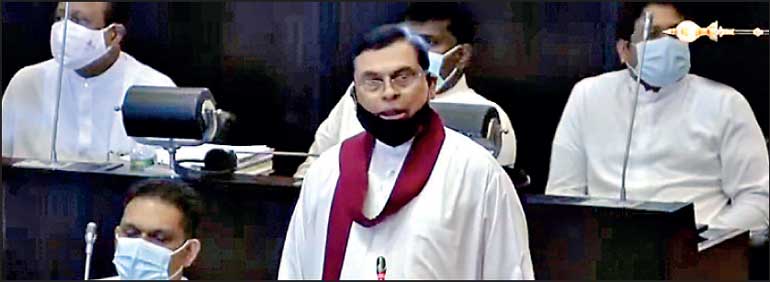Saturday Feb 21, 2026
Saturday Feb 21, 2026
Wednesday, 8 September 2021 00:25 - - {{hitsCtrl.values.hits}}

Finance Minister Basil Rajapaksa during his address in the Parliament yesterday
Basil Rajapaksa yesterday, in his first speech in Parliament as Finance Minister, painted a bleak picture of the economy and said that, amid the foreign exchange crisis, the country had lost around Rs. 1.6 trillion in Government revenue due to the COVID pandemic.
“The country is facing a serious foreign exchange crisis. Similarly, revenue has come down drastically. We don’t expect to overcome a crisis of this magnitude on our own but hope well-wishers and the Opposition will cooperate to solve this crisis,” Rajapaksa said.
Speaking during the debate on several finance Bills, Rajapaksa said that while the COVID-19 pandemic had aggravated the country’s economic woes, it was the poor economic management over previous decades which had led to this situation.
“We know that our expenditure has always been higher than revenue. There has also been waste, corruption and unnecessary expenditure over the years. We are making a sincere effort to address these issues,” the Minister said.
He said the loss of revenue for far this year was around Rs. 1,500-1,600 billion – more than that was estimated.
He said incomes from the three main sources – the Customs, Excise and Inland Revenue Departments – have plummeted.
“A large portion of Customs duties came from taxes on vehicles but for more than a year and half there was a ban on vehicle imports due to a lack of foreign exchange. Hence income from customs duties is almost nil. Excise income too has dropped due to lockdowns, during which sales were zero, while the collapse of tourism means excise duties from that sector too have dropped.”
Rajapaksa said income tax revenue too has dropped drastically.
“Whether we like it or not, the reality is that the bulk of tax money from taxes such as VAT comes from indirect taxes. During the lockdown, 75-80% of VAT revenue is lost per day.”
The Minister also said that while revenue is dropping, expenditure is on the rise.
“We have had to pay for 80% of the vaccines we imported. Similarly, lockdown or not, we have to pay those in the public sector, which we have done without reducing a single cent. In some sectors we have given additional allowances too.”
Rajapaksa also said the country’s income from tourism, which was between $ 4-5 billion, was almost nil since the onset of the pandemic in March last year.
“Workers’ remittances, which increased last year, have begun to fall in the past three to four months by 20-30%. The relevant ministers have been asked to look into this and see what measures can be taken to increase foreign remittances.”
He said that thanks to resilient exports the country had got some foreign exchange and that they hope to build on this.
“We are trying to limit the loans, and imports will be limited to essential needs and only for projects that have a return. We have to pay back loans that have been taken over the years by successive Governments. We have managed to lessen the debts we owe. Our goal is to make the country debt free.”
Rajapaksa said the Government would take loans from the World Bank, Asian Development Bank or other lending institutions, but not from those which attach conditions that impact the country’s sovereignty. “We have decided to use foreign assistance with utmost diligence.”
